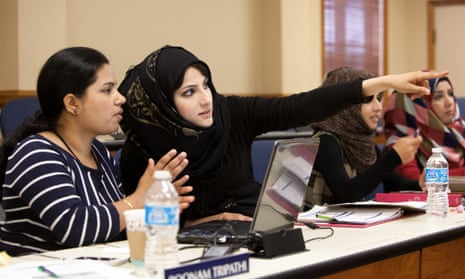According to the World Economic Forum’s Global Gender Gap Report, the Middle East and North Africa are the only regions where the overall economic standing did not improve in 2013. Yet, around the world, we are hearing a growing chorus that women are the key to economic development. It is a phenomenon experts often comment on – when you help a woman, she helps everyone around her.
I believe women helping one another is critical to improving their economic status, especially in post-conflict countries like Iraq, my home, where it is often difficult for women to find work primarily due to security issues and the breakdown of the market infrastructure. This is particularly heartbreaking for me, given that not too long ago women were active in nearly every sector of business. The conflict that erupted in my country reversed decades of progress and made it difficult for women to find work – let alone develop the skills to start their own businesses. Today, there are large professional gaps between men and women, gaps that I am dedicated to bridging.
A few years ago, I was given the opportunity to strengthen this bridge when the dean of Babylon University approached me about a program called Global Links: Empowering Women through Education & Opportunity, a public/private partnership between Tupperware Brands, Rollins College, the US Office of Global Women’s Issues and Women for Women International.
I was chosen as the inaugural Global Links scholar and immersed in a social entrepreneur program at Rollins College’s Crummer Graduate School of Business. The hope was that I would spread my newfound knowledge of business skills and mentorship upon my return to Iraq - and that is precisely what I did. I updated my curriculum and over the past year have had the opportunity to train 25 remarkable students.
This group of students have taken their training into the community and paid it forward, showing remarkable courage and fortitude in the face of adversity. Through the partnership with Women for Women International (WFWI), the students have mentored 75 women in life and advanced business skills at WFWI centers in Baghdad and Karbala. Many of the women they mentor have lost their husbands to violence and are now the sole breadwinners. Others are divorced, marginalized or never received any formal education. For them, this program is critical. It has taught them the fundamentals of business enabling them to generate sustainable income, but more importantly, it has empowered them and strengthened their conviction to succeed.
Each student works with five women and helps them identify a business opportunity. The students support the women in developing a plan and help them find solutions to challenges they face in launching their small businesses.
Watching women from diverse walks of life, such as uneducated single mothers or young educated women who previously attempted to start a business without support, apply the fundamentals of marketing and business to improve their own lives is truly inspiring. It strengthens my motivation to continue this work in spite of the major challenges in Iraq. When I see how these women share their knowledge and experiences not only with their families, but pass it on to other women within their community, I am filled with the desire to do more.
This is not just a program to help women; it helps protect the social environment, protects the peace and encourages others to think about social issues. I cannot emphasize enough the role the private sector can play in supporting women in post-conflict countries.
This month, I completed the final phase of the program. I traveled to the United States with a few of my students to share our experience and participate in a student exchange at Rollins College. After participating in workshop sessions with Rollin's students, faculty and alumni, my students were able to meet social entrepreneurs with successful businesses in the United States. They were all impacted by the story of an Arab-American business owner. One of my students said, “I related most to Debbie because she and I are similar. She believes a woman is more than a housewife. She shared the challenges she faced with her family and how they are now proud of her. She was passionate.”
My students know that they must utilize their education to take action and pursue what they want to accomplish. Given all they have learned and this recent dose of inspiration, I am confident they will continue changing lives after they graduate.
Dr. Amel Abed Mohammed Ali is a professor and head of the department of industrial management at Babylon University and the inaugural scholar on the Tupperware Global Links programme.

Comments (…)
Sign in or create your Guardian account to join the discussion